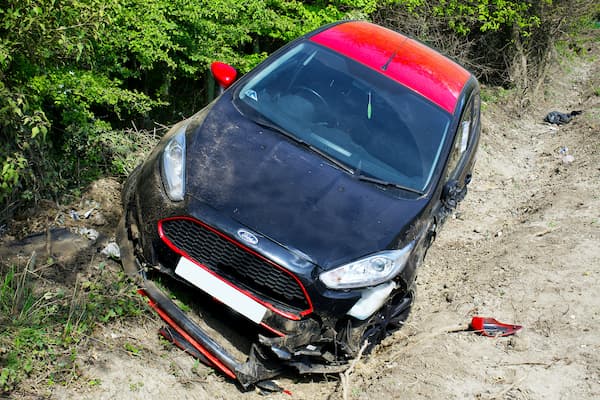No-Fault Insurance & Auto Accidents
Does “no-fault” insurance mean that you can’t sue for damages from an automobile accident in Michigan?
Much like “flammable” & “inflammable” this is a confusing label that leads many to think they can’t get the compensation they deserve from a car accident in Michigan. But let’s explore what Michigan’s no-fault laws mean and how they impact you when you’re injured in a car accident.

The History of Michigan’s No-Fault Law
The no-fault law, or officially the No-Fault Automobile Insurance Act was passed in 1973. It was a response to rising automobile insurance costs and concerns over the ability of accident victims to receive prompt and fair compensation.
Prior to the implementation of the no-fault law, Michigan, like many other states, followed a traditional fault-based system for auto insurance. Under this system, the party at fault in an accident was responsible for covering the damages and injuries of the other party. However, this often led to delays in receiving compensation and costly legal battles.
The no-fault law aimed to address these issues by establishing a system where each person’s insurance company would pay for their own medical expenses and related benefits, regardless of who caused the accident. This system was designed to provide prompt and guaranteed benefits to accident victims, while reducing the need for litigation and ensuring faster resolution of claims.
How Does No-Fault Insurance Work?
Under Michigan’s no-fault law, every vehicle owner is required to carry no-fault insurance, which consists of three primary components: personal injury protection (PIP), property protection insurance (PPI), and residual liability insurance.
PIP coverage provides benefits for medical expenses, wage loss, and other necessary expenses resulting from an auto accident, regardless of fault. PPI covers property damage caused by a vehicle to other people’s property, such as buildings or fences. Residual liability insurance provides coverage for injuries or damages that exceed the limits of the PIP and PPI coverage.
When you are involved in a car accident resulting in injury in Michigan, your insurance company and the other party’s insurance company will often attempt to contact you regarding the incident. To learn how to handle this, check out our handy auto accident injury guide.
Can You File a Lawsuit Even Though Michigan is a No-Fault Insurance State?

The short answer: Yes!
Michigan’s No-Fault insurance law includes a pivotal provision that grants individuals the legal right to sue the party responsible for their injuries if they have suffered a “serious impairment of body function or permanent serious disfigurement” and were less than 50 percent at fault in the accident. This crucial line provides ample motivation, with significant financial compensation, to file suit against the party responsible for your injuries.
What does “serious impairment of body function or permanent serious disfigurement” mean?
Michigan law is fairly clear about what constitutes serious impairment of body function or permanent serious disfigurement. In order for this to be proven in court, you must show:
(a) It is objectively manifested, meaning it is observable or perceivable from actual symptoms or conditions by someone other than the injured person.
(b) It is an impairment of an important body function, which is a body function of great value, significance, or consequence to the injured person.
(c) It affects the injured person’s general ability to lead their normal life, meaning it has had an influence on some of the person’s capacity to live in their normal manner of living.
The law further clarifies that an impairment does not necessarily have to be permanent in order to qualify for damages. It emphasizes that each individual’s injuries should be assessed on a case-by-case basis, taking into account the impact of the incident on their life before and after the event to determine the seriousness of the injury.
Typically, the serious impairment threshold serves as a means to pursue a bodily injury lawsuit based on the negligence of the driver and/or vehicle owner. However, it is important to note that a permanent and serious disfigurement can also be a separate avenue to meet this threshold. In many cases, if someone experiences a permanent and serious disfigurement, it is likely that they have also suffered a significant impairment of body function. Consequently, the determination of the serious impairment threshold is often subject to extensive litigation.
What If I Am Found Partially At-Fault For The Accident That Injures Me?
If the court determines that you were responsible for 50 percent or more of the accident in which you sustained injuries, you will not be eligible to receive any damages. In other words, if you are deemed “at fault” and carry the majority of the blame for the incident, the law prevents you from filing a lawsuit.
However, if you were only partially at fault, there is still a possibility for compensation. For instance, if you were slightly exceeding the speed limit at the time of the accident, it is likely that you bear some responsibility (but not more than half) for your injuries. The court will evaluate your case to determine the exact extent of your liability. Additionally, if you are found liable for any percentage of the accident’s cause, up to the 50 percent threshold, any economic damages awarded to you will be reduced by that proportion. This aspect of the law is known as “comparative fault,” and here’s how it functions.
For instance, suppose you are awarded $1 million in damages for your injuries, but the jury determines that you were 10 percent responsible for the accident. In such a scenario, your settlement would be reduced to $900,000, which is 90 percent of the total award. If you had been entirely blameless, you would have received the full $1 million. However, since your contribution to the accident was established, your compensation will be adjusted accordingly.
Were you injured in a car accident? Call us today to discuss your options!
Recent Posts
- How Much Does It Cost To File Chapter 7 Bankruptcy?
- Claiming A Child On Your Taxes With Joint Custody
- Prenuptial and Postnuptial Agreements In Michigan Divorces
- Filing Chapter 7 Bankruptcy When You Own Multiple Homes
- Can I Change My Child’s School?
- How Is Debt Handled In A Michigan Divorce?
- How To Choose a Bankruptcy Attorney
- What NOT To Say During Child Custody Mediation
- Does It Matter If My Spouse Cheated In a ‘No-Fault’ Divorce State?
- How Long Does Chapter 7 Bankruptcy Stay On Your Credit Report?
